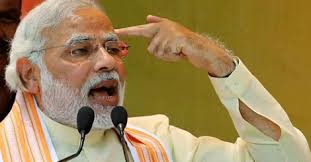Guruvayur, Jun 16: Nine more students were arrested by Kerala police on charge of using invectives to describe Prime Minister Narendra Modi through a crossword puzzle in a college magazine.
 The arrested students are from Sree Krishna College in Guruvayur and activists of Students Federation of India, the student wing of CPM. Student editor Vibin Raj, sub-editor P K Shihab, editorial members V A Ashiq, U S Sajil, Lenin Vishnu, Sahil, Girish, Alwin K Benny, K S Sanoop and N P Sajib were arrested for using objectionable language against Modi in the journal.
The arrested students are from Sree Krishna College in Guruvayur and activists of Students Federation of India, the student wing of CPM. Student editor Vibin Raj, sub-editor P K Shihab, editorial members V A Ashiq, U S Sajil, Lenin Vishnu, Sahil, Girish, Alwin K Benny, K S Sanoop and N P Sajib were arrested for using objectionable language against Modi in the journal.
"All the arrested students have been booked under section 153 of Indian Penal Code, which is regarding provocation with intent to cause riot," said Thrissur police commissioner P Prakash. They were later released on bail later.
Besides Modi, the students have allegedly mocked Kerala chief minister Oommen Chandy, Congress vice president Rahul Gandhi, party MP Shashi Tharoor as well as spiritual leader Mata Amrithanandamayi.
Police said the remaining three accused, chief editor and college principal D Jayaprasad, staff editor Santhosh and advisory board member P G Subindas, would be arrested soon.
NaMo
The college magazine titled 'Name' had used Modi's nickname 'NaMo' as a crossword clue with the purported solution 'NAyeente MOn' (son of a dog).
However, P Sanoop, who was part of the editorial team of the magazine, said that the content "was not intended to malign any person". Principal Jayaprasad said the controversial crossword was finalized without his and the staff editor's consent. "The content in question was not published with my knowledge or permission," he said.
The police commissioner seemed to corroborate this. "The complaints were lodged by ABVP and KSU. Evidence is clear against the accused students but at this point we don't have clinching evidence against the principal. More investigation is needed to ascertain whether the principal was involved."
The Guruvyaur Sree Krishna temple managing committee, which runs the college, had sought an explanation from the principal in connection with the case.
This was the second such case reported from the area after the campus magazine of a polytechnic college featured Mr. Modi in the list of “negative faces” along with Adolf Hitler, Osama bin Laden, George Bush and a few other internationally-known figures.
The principal and a few students of the polytechnic college were arrested and let-off on bail last week after police had charged them under the same sections of the IPC.
Police also raided the polytechnic college and seized 392 copies of the magazine, a computer and hard discs of the designers of the magazine.






Comments
Pretty nice post. I just stumbled upon your weblog and wanted to
say that I've truly enjoyed browsing your blog posts.
After all I'll be subscribing to your feed and I hope you
write again soon!
Stop by my weblog; skoda: https://octavia.team/profil/2-namo/
Add new comment